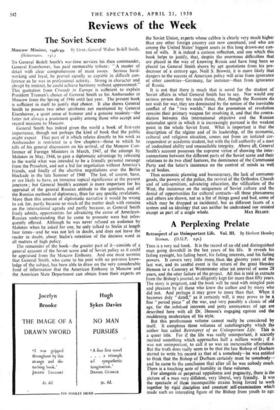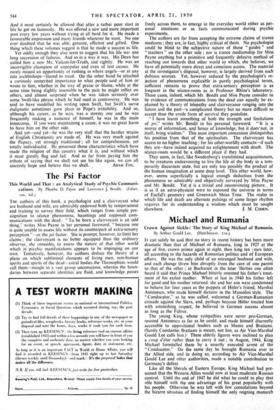A Perplexing Prelate
Retrospect of an Unimportant Life. Vol. III. By Herbert Hensley Henson. (O.U.P. 2 ss.) THIS is a very sad book. It is the record of an old and distinguished man going downhill in the last years of his life. It reveals his failing eyesight, his failing heart, his failing interests, and his failing powers. It covers very little mock; than, the gloomy years of the last war, and its central event is the return of the great Hensley Henson to a Canonry at Westminster after an' interval of some 28 years, and the utter failure of the project. All this is told in extracts from the Bishop's journal, so diligently kept for more than fifty years. The story is poignant, and the book will be read with mingled pain and pleasure by all those who knew the author and by many who did not. And perhaps it may grow to more than that. When it becomes duly " dated," as it certainly will, it may prove to be a fine " period piece " Of the war, and very possibly a classic of old age, for the ,subdued interests and petty annoyances of age are described here with all Dr. Henson's engaging egoism and the maddening moderation of his style. But this posthumous volume cannot really be considered by itself. It completes three volumes of autobiography which the author has called Retrospect of an Unimportant Life. This is a queer title. For if the life was really unimportant, it scarcely merited something which approaches half a million words ; if it was not unimportant, to call it so was an inexcusable affectation. But the truth does really seem to be that the late Bishop of Durham started to write his record as that of a somebody—he was entitled to think that the Bishop of Durham certainly must be somebody— and he came to the conclusion that after all he was nobody much. There is a touching note of humility in these volumes.
For alongside of perpetual uppishness and pugnacity, there is the picture of a man .very diffident, very liberal, very friendly. It was the spectacle of the* incompatible strains being forced to work together by rigid discipline and constant self-examination which made such an interesting figure of the Bishop from youth to age. And it must certainly be allowed that after a rather poor start in life he got on famously. He was offered a new and more important post every few years without trying at all hard for it. He made a favourable impression and many friends wherever he went. No one ever doubted that he was able, genuine, efficient and gifted. One thing which these volumes suggest is that he made a success oi: life. Yet oddly enough they also seem to suggest that his life wa' one long succession of failures. And so in a way it was. His Dean has called him a new Mr. Valiant-for-Truth, and rightly. He was an incorrigible champion of unpopular and even of lost causes. He rarely missed an opportunity of rushing in where angels—or at any rate archbishops—feared to tread. On the other hand he attached a curiously unmerited importance to what people said of him or wrote to him, whether in the way of praise or blame, while at the same time being slightly insensible to the pain he might inflict on others, and almost surprised when he was taken seriously over some Swift-like phrase which he had used in controversy. He was said to have modelled his writing upon Swift, but Swift's saeva fndignatio sometimes gave place to Pope's irritability. And so, although his career, as he says, was a .stormy one and he was frequently making a nuisance of himself, he was in the main innocuous. If you were maintaining a cause, it was no great harm to have him on the other side.
And yet—and yet—he was the very stuff that the hardier strains of English Christianity are made of. He was very much against the Papacy, yet strongly traditional ; all for comprehension, yet totally individualist. He possessed those characteristics which have made the religion of this country what it is, and without which it must greatly flag and fail. And so far from paying him the tribute of saying that we shall not see his like again, we can all sincerely hope and believe that we shall. ADAM Fox.







































 Previous page
Previous page